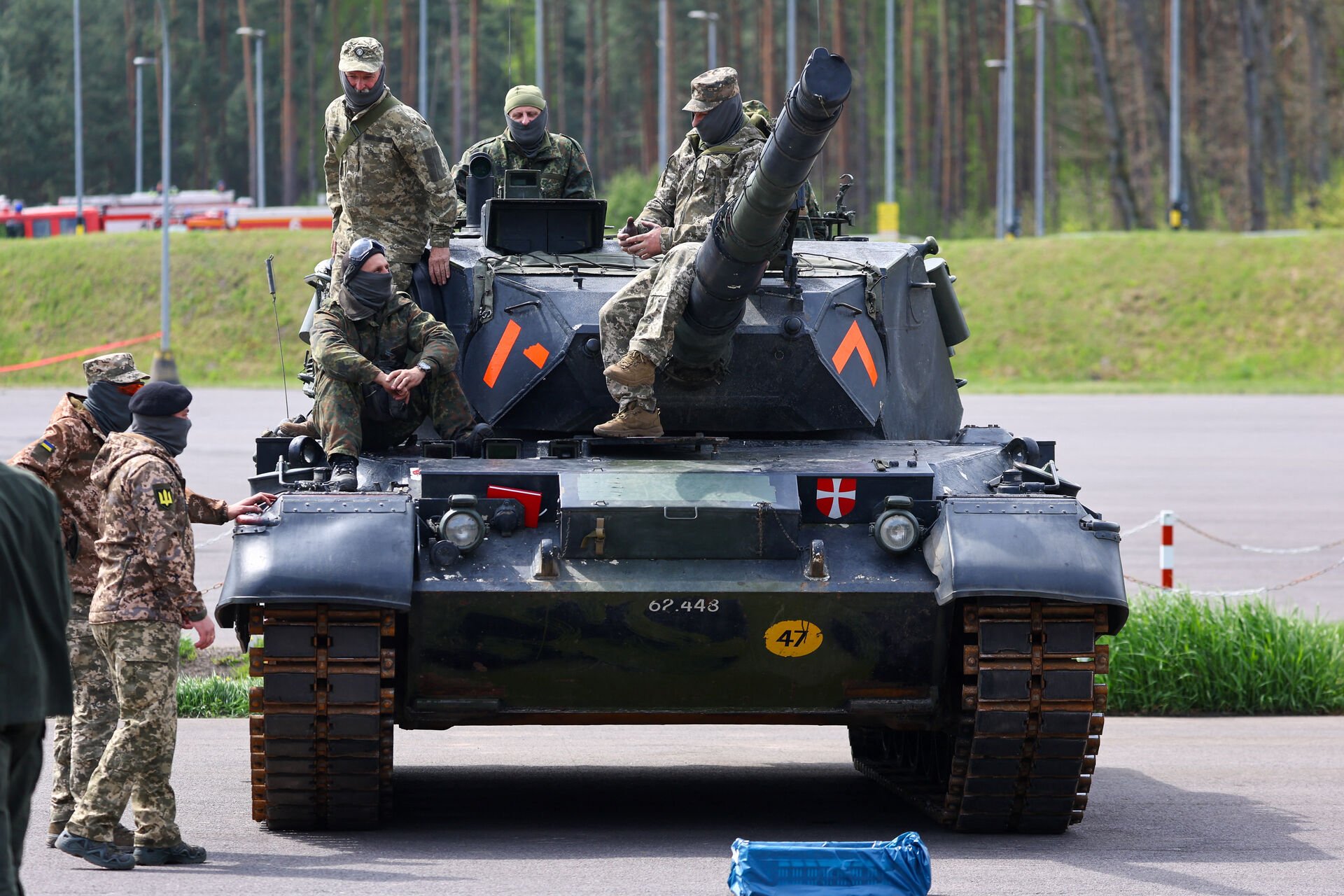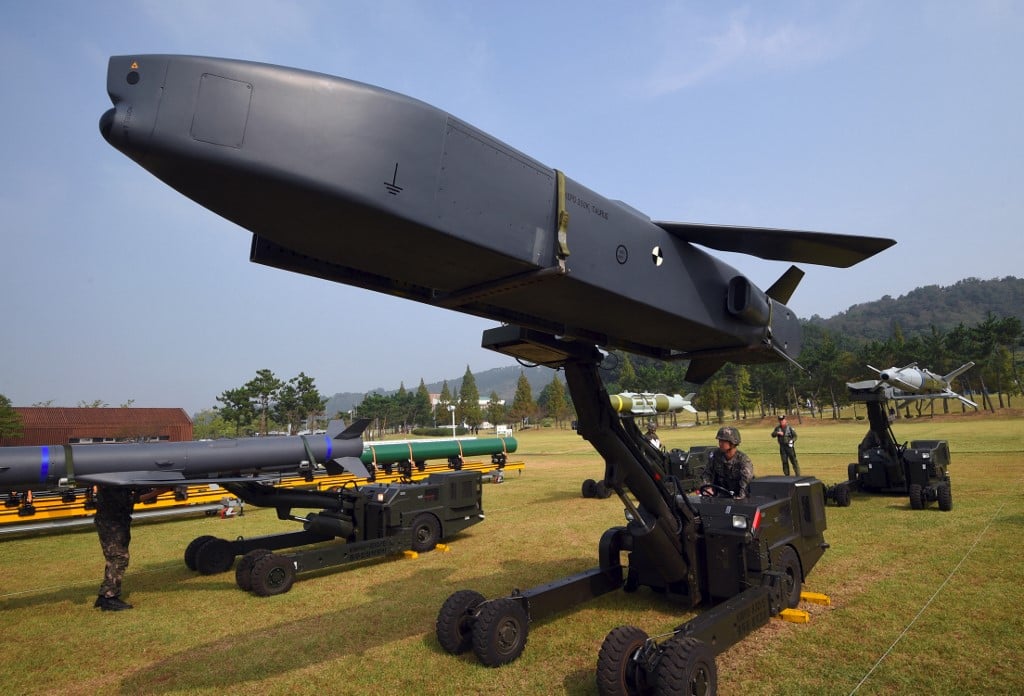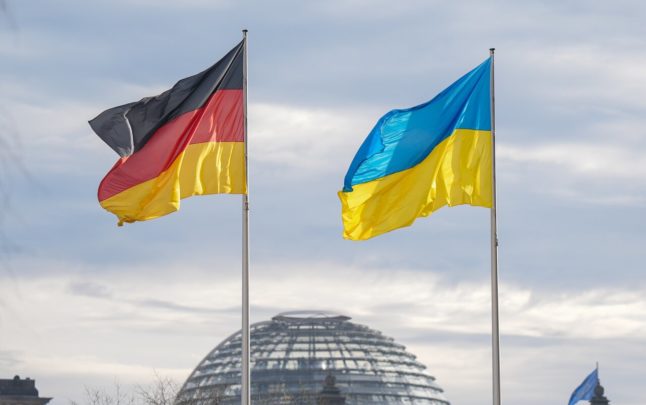Two years ago, just before Russia started firing its missiles into Kyiv itself, nearly three quarters of Germans surveyed in one poll opposed sending weapons to Ukraine. Now, in 2024 – not only has public opinion shifted, but Germany is now Ukraine’s second-largest donor of military support in absolute terms.
Yet, it’s still not enough.
EXPLAINED: Are Germans really that pacifist anymore?
That’s because Chancellor Olaf Scholz has regularly had to be dragged into providing key support for Ukraine, preventing Kyiv from getting decisive help quickly – when it needs it. Scholz has yet to explicitly say that Ukraine should win the war with Russia. He has cautioned Germany about the danger of a Russian victory – but this is different from saying Ukraine should win.
That’s left Berlin-based security experts to reason that the outcome Scholz prefers is a stalemate – where neither side wins and some negotiated settlement theoretically de-escalates tensions with Russia while forcing Ukraine to accept territorial losses.
READ ALSO: Two years on: How many Ukrainians have come to (and stayed in) Germany?
But stalemate with Russia never lasts. The Minsk Agreement was supposed to freeze the Russo-Ukrainian War that’s been going on in Crimea and the Russia-occupied territories in eastern Ukraine since 2014 in place. But Russia violated it by trying to invade the entire country. The history of Russia’s aggression against its neighbours, whether Ukraine since 2014, Georgia in 2008, or Moldova – shows us that Putin’s Russia has an insatiable imperialist drive to expand its borders through force.

What’s more is that Scholz’s dithering over the last two years has made Ukrainian defeat – rather than stalemate – a real possibility. Last year’s decision to send Leopard tanks to Ukraine was achieved only after concerted pressure from backbench parliamentarians and from the US. Although Scholz would finally relent and send them, it took months – robbing the Ukrainians of valuable time to make gains on the battlefield.
READ ALSO: What difference could Germany’s Leopard 2 tanks make in Ukraine?
This year, the Chancellor continues to refuse to send Taurus cruise missiles – which would allow Ukraine to hit Russian supply lines that they’re not able to hit yet with the equipment they have. The debate has dragged on for months. Two parliamentary motions from the opposition CDU calling on Scholz to deliver Taurus have failed. Parliamentarians from his own coalition then drew up their own, but members of the Chancellor’s Social Democrats effectively sabotaged it by taking out any mention of the word “Taurus”.
Meanwhile, Iran is now preparing to send Russia long-range cruise missiles of its own – which the Ukrainians won’t have. As Ukraine runs dangerously low on ammunition, the Russians are outfiring the Ukrainians by a ratio of around 5-1. Still, despite two years to get its act together, European countries, including Germany, still haven’t made appreciable efforts to up their ammunition stocks.
In the meantime, a plurality of ordinary Germans surveyed in a recent Yougov poll think the government isn’t doing enough to ensure that Ukraine win, with 44 percent saying too little it being done, compared to 26 person who say the government is doing enough or too much.
ZEITENWENDE: How war in Ukraine has marked a historic shift in Germany
So if both the public and members of his own coalition want more done, why isn’t Scholz acting?
Scholz’ nervousness a problem
The Chancellor hasn’t answered this question directly, but security experts point to his nervousness that any additional weapon he sends could result in escalation by Russia – including by attacking Germany.
Yet escalation is already happening. No one expects Russia to be ordering long-range cruise missiles from Iran that it doesn’t intend to use – but Scholz still won’t deliver Taurus cruise missiles to Ukraine to match the Russian arsenal.

Furthermore, self-congratulation in Germany about finally hitting NATO’s defence spending target of two percent of GDP is likely to be short-lived if Kyiv falls. Putin could well be emboldened to test the NATO military alliance of which Germany is part by attacking an actual NATO member – something he’s not yet done militarily.
That would likely lead to Germany having to spend even more on defence. Already, some parliamentarians say the current special fund of €100 billion to modernise the German army simply won’t be enough.
PODCAST: Why Germany is getting ‘war ready’ and the growing citizenship application backlog
“We have to do more for Ukraine and we have to do more for our own security,” Anton Hofreiter, Chair of the Bundestag’s European Affairs Committee, told journalists at a press event this week at the German Council on Foreign Relations (DGAP).
“For all of this, we need a lot of money. So, we have to put at least €100 billion more into our army and ammunition. I think we should have a European fund of around €100 billion to buy – now – from all over the world, ammunition and weapons for Ukraine. And then I think we should have another €100 billion to make our infrastructure secure. I think that is really needed fast, because the Russian army is preparing to test NATO.”
.@ToniHofreiter, EU Committee Chair @Bundestag, suggests a 🇪🇺 €100bn fund "to buy #ammunition & #weapons for #Ukraine all over the world," €100bn to "make our #infrastructure secure" & 100bn more for 🇩🇪 defence – as Russia's will likely test @WeLoveNATO 2/8 pic.twitter.com/tipvxgNDuy
— Benjamin Tallis 🇺🇦 (@bctallis) February 21, 2024
Ultimately, as frontline Baltic state politicians have warned for years, Putin is emboldened by weakness and will push forward with his imperial ambitions until he is stopped. He doesn’t care about Scholz’s escalation fears. To him, such fear is weakness and an invitation to escalate. Perversely, German fears of escalation end up risking Russian escalation – the very situation Scholz seems so desperate to avoid by not giving Ukraine what it needs to win.
“Continuous western support to Ukraine until victory. This is the only language autocrats understand. They constantly calculate our response against potential gains,” says Lithuanian Foreign Minister Gabrielius Landsbergis. “If we won’t stop them in Ukraine, sooner or later, we will not escape a direct fight and we will pay a much higher price.”
Not too late to act
It’s not too late though. There is still time to stop Putin in Ukraine – but it will require western countries, including Germany, to take much more decisive measures – something some members of the Bundestag are already calling for.
“President Zelensky has made clear what Ukraine needs most – ammunition, ammunition, ammunition and long-range cruise missiles,” said Dr. Sebastian Schäfer, spokesperson for the Greens on the Bundestag’s Budget Committee and Deputy Chair of the Bundestag’s Committee for the Special Fund for the Bundeswehr – at the DGAP press event Monday.
“We need to do everything we can do to finally stop the Russian war machine. We must fully enforce the sanctions and frozen Russian assets in their entirety must serve the liberation and reconstruction of Ukraine,” he said.
"We must fully enforce the #sanctions and [seize] frozen Russian assets in their entirety to serve the *liberation* & reconstruction of #Ukraine. #MakeRussiaPay,”
Said @sebastian_es_ Budget Committee Spokesperson @GrueneBundestag.@OlenaHalushka @HopkoHanna 6/8 pic.twitter.com/JFZW3gT1Yx— Benjamin Tallis 🇺🇦 (@bctallis) February 21, 2024
“Putin is constantly challenging us,” said Hildegard Bentele, Member of the European Parliament with the European People’s Party, at the DGAP press event. “I think we really need to show that we’re in crisis mode.”
READ ALSO: Germany needs to be ‘war ready’ in 5 years: army chief-of-staff




 Please whitelist us to continue reading.
Please whitelist us to continue reading.
Totally disagree. The myth that Putin and Russia have imperialistic desires to take over Europe needs to be challenged more often. We need to educate ourselves on the history of this conflict, beginning in 2014. It’s not as simple as Putin invaded because he’s just a big scary bad guy and a threat to all of Europe. Draining the German economy to support a proxy war is not an effective solution, especially when the economy is already being weakened.